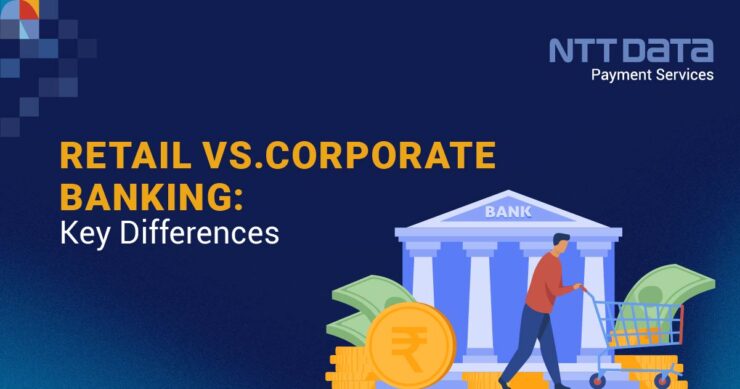
Table of Contents
Banking is a fundamental aspect of the global economy, providing financial services to individuals, businesses, and governments. Within the banking industry, two major sectors dominate the landscape. Retail banking and corporate banking are two essential sectors within the banking industry, each with distinct characteristics and target audiences.
Retail banking caters to individual customers, offering personal accounts, loans, and everyday banking services through a branch network. In contrast, corporate banking serves businesses, institutions, and government entities, providing specialised financial solutions such as trade finance, cash management, and customised lending.
Let’s explore the key differences between retail Vs corporate banking below.
Banks That Support Public And Private Entities
Banking plays a vital role in the economy by providing financial services to individuals, businesses, and governments. Two distinct sectors dominate the banking industry: retail banking and corporate banking. While both cater to different clientele and have distinct objectives, they play crucial roles in the overall functioning of the financial ecosystem.
Retail banking emphasises customer service and building relationships, while corporate banking focuses on tailored services and industry expertise. Recognising the disparities between these two sectors allows for a better understanding of their roles in the economy and the diverse financial needs they address.
Suppose you are self-employed or running a small business. In that case, banks ensure which type of account and incorporation would suit you to avail of their services and a perfect payment gateway to help you accept payments seamlessly.
Recent Web Stories
6 Key Differences Between Retail Vs Corporate Banking
In general, retail banks offer basic banking services through branches of networks to serve individual consumers. On the other hand, corporate banks target businesses and institutions, providing specialised services, tailored financial products, industry expertise, and custom solutions to address the unique needs and complexities of the corporate world.
Let’s explore the unique services and features of retail vs corporate banking with their key differences.
1. Clientele:
Retail banking caters to individual customers’ and small businesses’ financial needs. These services include opening savings and checking accounts, issuing credit and debit cards, providing personal loans and mortgages, and facilitating basic investment options.
Corporate banking serves larger enterprises, multinational corporations, and institutional clients. It delivers complex financial solutions such as corporate loans, trade finance, cash management, foreign exchange services, and investment banking products.
2. Services Offered:
Retail banking is known for its customer-centric approach, offering a wide range of services that are tailored to individual needs. These services include basic banking operations, such as depositing and withdrawing funds, issuing credit and debit cards, providing loans, mortgages, and insurance products, and facilitating online and mobile banking. Retail banks also build customer relationships through personalised assistance, branch networks, and easy accessibility.
In corporate banking, the services provided are more specialised and tailored to suit the needs of larger businesses. This includes corporate lending, project finance, capital market services, treasury management, risk management, and advisory services. Corporate banks work closely with clients to understand their business goals and offer custom financial solutions that optimise operations, manage risks, and support growth.
3. Risk Profile:
Retail banks deal with many small-scale transactions and customers, resulting in more diversified risk exposure. While the risk associated with each customer may be relatively low, the cumulative risk across the customer base can be substantial. Retail banks focus on managing credit risk, ensuring responsible lending practices, and maintaining a stable customer base.
On the other hand, corporate banks face a higher level of risk due to the size and complexity of their client’s operations. The financial transactions involved in corporate banking are generally larger, making the potential impact of any adverse event significantly greater. Corporate banks must evaluate creditworthiness, monitor market risks, and provide risk management solutions to safeguard their clients’ interests and maintain stability in the financial system.
4. Relationship Management:
Retail banking emphasises building strong customer relationships by providing personalised services and convenient banking experiences. Retail banks often have a widespread branch network, customer support services, and digital banking platforms to ensure accessibility and ease of use. They focus on nurturing long-term customer relationships, offering financial advice, and addressing their financial goals and needs.
Relationship management in corporate banking revolves around serving large clients and understanding their unique business requirements. Relationship managers work closely with their corporate clients, often acting as trusted advisors, providing strategic financial guidance, and developing tailored solutions to their complex financial needs. Corporate banks often have specialised relationship management teams that work with other departments to deliver comprehensive financial services to their clients.
5. Business Model:
The business model of retail banking depends mainly on the services to people and small businesses. They provide loans, investments, mutual funds, and issuance services to people on a small scale to grow their customer base.
The business model of corporate banking depends on cash management solutions to optimise the liquidity of businesses. These services include account management, payment processing, treasury services, and electronic banking platforms, enabling companies to streamline their financial operations.
6. Loans Offered:
Retail banks offer various kinds of loans to public people, such as personal loans, educational loans, vehicle loans, home loans, and other customer-oriented banking services.
Corporate banks offer a range of lending options tailored to meet the financing needs of businesses. They provide credit facilities, corporate loans, project financing, and syndicated loans, enabling companies to fund their operations, expansions, and strategic initiatives.
Key Takeaways From Retail Vs Corporate Banks
| Category | Retail Bank | Corporate Bank |
| Target Audience | Focuses on employees and self-employed people as customers. | Focuses on businesses and corporations as customers. |
| Services Offered | Small-scale services like credit cards, personal loans, and savings account management. | Industrial solutions for cash flow management, investments, and bonds. |
| Fund Management | Low-value transactions | High-value transactions |
| Customer Relationships | Customers can reach out to the branch and get access to the best schemes and plans. | The bank arranges a team of financial experts to handle the Personal Relationship with the corporate client for growth enhancement. |
| Loans Offered | Can offer loan upto Rs. 5 Cr | Can offer a loan of more than Rs. 5 Cr+ |
Retail banking, or consumer banking, focuses on providing financial services to individual customers. It serves as the face of the banking industry for most people, dealing with personal accounts, loans, and everyday banking transactions. Retail banks aim to cater to the financial needs of the general public and provide accessible services that are tailored to individuals and households.
Corporate banking, also known as business banking or commercial banking, targets large corporations, small-to-medium enterprises (SMEs), institutional clients, and government entities. Corporate banks play a crucial role in facilitating complex financial transactions, supporting business growth, and managing the financial needs of companies.
Did you know? Some of the largest corporate banks in the world have historical origins dating back several centuries. For example, Barclays, a renowned corporate bank, traces its roots all the way back to 1690, when it started as a goldsmith banking business in London. Over the centuries, it evolved into a prominent global financial institution, showcasing corporate banks’ longevity and enduring legacy in the ever-changing economic landscape.
Easy Banking With NTT DATA Payment Services
Almost 50% of cyber attacks happen on SMBs (small & medium sized businesses). It’s high time to secure your bank transactions with a trusted payment gateway partner. Let me introduce NTT DATA Payment Services; Your payment is secured with leading technological advancements and state-of-the-art security features.
NTT DATA Payment Services ensures your payment gateway has cutting-edge technology features and embraces emerging payment methods such as digital wallets and UPI lite. We make payments easy and quick to keep your business bulletproof.
Fundamentals and Disparities of Retail and Corporate Banks
In conclusion, the distinctions between retail banking and corporate banking are evident in their target audiences, services offered, customer relationships, and risk profiles. Banks today also practice digital currencies to make transactions easier.
Retail banks cater to individual customers, providing basic financial services and prioritising personalised customer service.
On the other hand, corporate banks focus on businesses, institutions, and government entities, delivering specialised financial solutions to meet their complex needs.
Understanding these key differences helps us appreciate the diverse roles these sectors play in the economy and their contributions to the financial well-being of individuals and businesses alike. Both retail and corporate banks are integral components of the banking industry, working in tandem to support economic growth, foster financial stability, and serve as pillars of the global financial system.
| Also you can get frequent updates on nttdatapayments Instagram page. |
FAQs
- What is the difference between retail banks and corporate banks?
A retail bank addresses the public citizens of the country, aiding all their financial and banking needs, such as managing their savings accounts or lending loans. On the other hand, corporate banks are more addressed towards corporations who need an optimisation of their financial operations through the bank.
- What is the difference between corporate and personal banks?
A corporate bank provides financial products and services to corporate customers or corporate bodies. In contrast, a personal bank provides financial plans and support to an individual or a person.
- What is the difference between retail and wholesale banking?
Retail banking is a process that involves one particular individual regarding their relationship with the bank. On the opposite, wholesale banking is a process that involves a group of individuals or a client network based on their business regards.
- What is retail and corporate net banking?
Retail banking services cater to the general public, while corporate banking can facilitate small and big companies or corporates.
- What are five important banking services?
The five important banking services are
- Saving or current accounts services
- Loan and mortgage services
- Wealth management services
- Providing credit and debit cards
- Overdraft services







